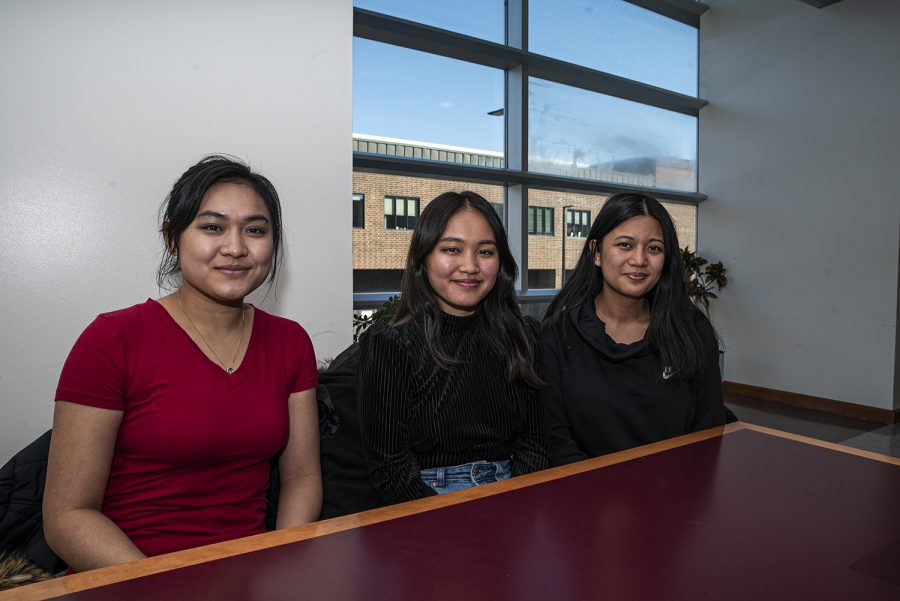New Burma/Myanmar student organization hopes to provide a community to students
Three Burmese students began gathering with friends to form a community of peers from the same country. Now, they have formed an official student organization hoping to educate people about their culture.
Burmese American Student Organization Secretary, Chocho Stay, Vice President Teresa Bochung, and President Natalie Kyaw pose for a portrait in the College of Engineering on Friday, February 21st, 2020. The club is a way for students of Burmese heritage to interact and connect with a group of people with a shared cultural identity.
February 23, 2020
Navigating the education system as a non-native English speaker proved to be a challenge for Burmese student Teresa Bochung. The University of Iowa student spent all of middle school learning how to speak English and eventually developed support groups of friends in high school.
Upon arriving at the UI, however, Bochung soon learned that she did not have similar support groups available to her. With a desire to spark a change, Bochung and a group of friends developed a student organization to help students like herself navigate college.
Feeling like their culture was lacking in representation on the UI campus, three students founded the Burma/Myanmar Student Association this month to create a community of support among Burmese students and educate people about their culture.
Myanmar, also known as Burma, is a country in southeast Asia near Thailand. In fall of 2019, UI Registrar’s Office data recorded four international students from Burma. (The total wouldn’t include Burmese American students.)
The organization’s goal is to bring Burmese students together and help underclassmen feel more at home at the UI, said Bochung, the organization’s vice president.
The founders hope the group will aid students in forming a support system and help each other through the struggles of being a college student, making the transition to a university a little easier, said Natalie Kyaw, the association’s president.
“Growing up, I went to an almost all-white school, so they didn’t know where Burma is, and they always asked me, ‘Where’s Burma?’ ” Kyaw said. “I always had to pull up a map and tell them, ‘Oh, it’s right by Thailand.”
RELATED: New UN student organization allows for students to participate in international advocacy
Kyaw, Bochung, and ChoCho Htay, the organization’s secretary, formed a group of seven students who would gather together last year, Kyaw said. Before winter break, the three decided to create a student organization once they had enough people. They wrote up a constitution and then earned their student-organization status at the beginning of this semester, Kyaw said.
The three had talked about creating a student organization for Burmese students but had yet to do it before now, Htay said.
“When I came to the university, wherever I [would] look there was no one that I actually know or people from my country,” Htay said. “It makes me feel left out. I don’t have anyone to talk to and then I’m not close with people… If you already have someone that speaks your language it will be a really big support.”
Many members of the organization are first-generation students or refugees, Bochung said, making them unfamiliar with the challenges of college in the U.S.
For their first meeting, the organization saw about 15 people in attendance, which was more than its leadership expected, Bochung said. It has been challenging to set up meetings because of other meetings and commitments each member may have, she added.
Although the club is just kicking off, the executive team plans to hold events this semester and showcase Burmese culture. The group plans to have a potluck in March to help the members get to know each other, Kyaw said.
To celebrate the Burmese New Year, the organization will also host an event in April open to the community, Bochung said. The Burmese New Year, otherwise known as the Water Festival for its tradition of throwing water at one another, will be celebrated by the organization through showcasing traditional outfits worn in Burma and creating models of the houses in the country, she said.
The celebration will also include Burmese food for people in the area to try, Htay said. They want people to come to see what the food tastes like and understand how it is made, she added.
“We wanted to start our own [student organization] so we’re more relatable,” Bochung said. “We’re definitely targeting students from Burma or who speak Burmese, but we’re also open to [people from] our neighboring countries. For anyone, even Americans who wish to learn about our culture, we’re definitely open to that moving forward so everyone can say, ‘Oh, I know where [Burma] is.’ ”



